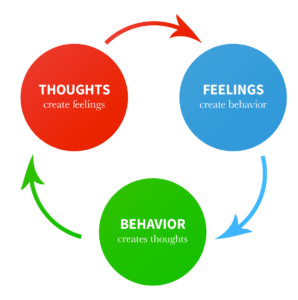Do you suffer from OCD? If so, you know how difficult it can be to manage your condition. CBT ERP therapy is a treatment that has been shown to be effective in helping people overcome their OCD. In this blog post, we will discuss the benefits of CBT ERP therapy and how it can help you manage your OCD symptoms.
Contents
What Is CBT ERP Therapy?
 CBT ERP therapy is a form of psychotherapy that focuses on helping patients overcome their OCD thoughts utilizing cognitive-behavioral techniques. This type of therapy works by gradually exposing the patient to their fear or triggers in a safe environment. In doing so, the patient can learn how to confront and overcome their fears and anxieties in a more productive manner.
CBT ERP therapy is a form of psychotherapy that focuses on helping patients overcome their OCD thoughts utilizing cognitive-behavioral techniques. This type of therapy works by gradually exposing the patient to their fear or triggers in a safe environment. In doing so, the patient can learn how to confront and overcome their fears and anxieties in a more productive manner.
The goal of CBT ERP therapy is to help the patient learn healthier ways of responding to situations that may have previously been overwhelming. Additionally, this type of therapy can help people to gain control over their negative thought patterns and behaviors.
CBT ERP is generally conducted with a therapist and involves both individual and group therapy sessions. During the therapy process, the patient will work to identify their triggers and practice techniques for managing them in a healthy manner.
Ultimately, the CBT ERP therapy for OCD can help patients gain control of their thoughts and behaviors, reduce anxiety levels, and improve the overall quality of life. If you think that CBT ERP therapy might be right for you, it is important to speak with your doctor or therapist about the best treatment options available for your unique situation.
How Does It Work?
If you are considering CBT ERP therapy for your condition, you may be eager to learn more about the process. In general, CBT ERP involves a combination of cognitive behavioral therapy (CBT) and exposure and response prevention (ERP).
CBT is a form of talk therapy in which you work with your therapist to identify patterns of thinking that may be contributing to your symptoms or making them worse. You will learn how to identify, challenge, and adjust these unhelpful thought patterns in order to reduce the intensity of your distress.
Exposure therapy is a type of CBT that helps you confront the fears or worries associated with your condition. During ERP, you learn ways to expose yourself to feared thoughts, memories, situations, and objects in a safe and controlled manner. This helps you to gradually become less sensitive and less anxious when exposed to these fear-inducing stimuli.
Your therapist will work with you to create a personalized treatment plan that includes both CBT and ERP techniques. These may include relaxation exercises, cognitive restructuring activities, mindfulness practices, exposure drills, and other evidence-based strategies. Over time, you will learn to recognize and manage your emotions, thoughts, and behaviors in more constructive and effective ways.
CBT ERP is typically provided by a mental health professional such as a psychologist or psychiatrist who has been trained in providing the safest treatment.
What Are The Benefits Of CBT ERP Therapy?
 When it comes to treating mental health issues, CBT ERP therapy is a powerful and effective tool. It can provide the patient with relief from the symptoms of depression, anxiety, and other disorders. Here are some of the benefits of CBT ERP therapy:
When it comes to treating mental health issues, CBT ERP therapy is a powerful and effective tool. It can provide the patient with relief from the symptoms of depression, anxiety, and other disorders. Here are some of the benefits of CBT ERP therapy:
- Improved Self-Awareness and Self-Esteem: Through the process of CBT ERP, patients are able to develop a greater understanding of their thoughts, emotions, and behaviors. This helps them become more self-aware which in turn boosts their self-esteem.
- Reduced Symptoms: CBT ERP therapy can help reduce symptoms associated with depression and anxiety, such as low mood, fatigue, and restlessness. As the patient progresses through the therapy sessions they learn better-coping skills which help them manage their emotions and thoughts more effectively.
- Improved Quality of Life: As patients become more self-aware and learn to manage their symptoms better, they can improve their quality of life. This means that the patient can enjoy activities, socialize with friends, and increase their level of self-care without worrying about how it will affect their mental health.
- Long-Lasting Benefits: Unlike other forms of therapy such as medication or talk therapy, CBT ERP has lasting effects. The skills and knowledge acquired during the therapy sessions can be used in all aspects of life, even after the end of treatment. This makes it an ideal option for those looking to make long-term changes to their mental health.
CBT ERP is a powerful tool for those seeking to manage their mental health issues and improve their overall well-being. By working with a qualified therapist, patients can learn the skills necessary to better understand and manage their thoughts, emotions, and behaviors for lasting positive change.
Is CBT Different From ERP?
Yes, CBT and ERP are different therapy approaches. Cognitive Behavioral Therapy (CBT) is a form of psychotherapy that addresses maladaptive thinking styles and behaviors in order to improve psychological functioning. It has been used to treat a wide range of mental health issues such as depression, anxiety, substance abuse, eating disorders, and more.
On the other hand, Exposure and Response Prevention (ERP) is a form of Cognitive Behavioral Therapy (CBT). It helps people with anxiety disorders learn to cope by gradually exposing themselves to the situations they fear and helping them develop new responses. It focuses on reducing or eliminating uncomfortable symptoms or behaviors related to exposure.
Both are evidence-based therapies with a strong track record of success. However, they differ in their approach. CBT focuses on changing unhelpful thoughts and behaviors. While ERP focuses more on exposure to the things people fear and helping them learn better ways to cope.
Ultimately, both approaches are designed to help people manage symptoms of mental health issues and lead more productive and healthy lives. Choosing which one is right for you will depend on your particular needs and preferences. Talk to a mental health professional if you need help understanding your options.
How To Find The Right Therapist For You?
 If you are considering CBT ERP Therapy for your OCD, you may be wondering how to find the right therapist for you. Here are some tips on what to consider when looking for a CBT ERP Therapist:
If you are considering CBT ERP Therapy for your OCD, you may be wondering how to find the right therapist for you. Here are some tips on what to consider when looking for a CBT ERP Therapist:
- Choose a therapist who is experienced with treating OCD – Choosing someone who has experience and expertise in treating OCD can help ensure that your treatment will be effective and tailored to your individual needs. Make sure to ask any potential therapist about their experience in treating OCD.
- Ask specific questions – Don’t be afraid to ask your potential therapist questions, such as what type of CBT ERP they use, how long they have been practicing, and if they are a member of any professional organizations related to OCD treatment. Knowing the answers to these questions can help you make an informed decision about the therapist you choose.
- Look for a good fit – An OCD treatment program should be tailored to your individual needs and circumstances, so it is important to look for someone who understands your specific situation. Ask yourself if you feel comfortable talking openly with this person, if their approach or style of treatment resonates with you, and if you feel hopeful about the possibility of recovery.
- Get a referral – If possible, ask your primary care physician or another professional for a referral to an OCD specialist. Referrals from trusted sources can help ensure that you get the best possible care.
Remember, it is important to find a therapist who is right for you. If the person you choose isn’t the best fit, don’t be afraid to look for someone else until you find the right one. With patience and perseverance, you can find an OCD specialist who can effectively treat your condition.
Conclusion
In conclusion, CBT ERP therapy is often a highly effective treatment for a variety of mental health issues, including depression, anxiety, and OCD. It is a particularly useful therapy because it can be used in both short-term and long-term contexts. Moreover, it is relatively cost-effective when compared to other forms of therapy.
Its ability to target and address specific problem areas allows therapists to tailor the treatment to the individual patient’s needs and goals. By using a combination of cognitive and behavioral approaches, CBT ERP therapy can help an individual gain greater insight into their behavior and thoughts.
For more information and guidance, do not forget to reach out to OCDMantra. It is a mental health disorder characterized by obsessions and compulsions. If you have any queries regarding OCD treatment, ERP therapy experienced therapists at OCDMantra can help: Book a trial OCD therapy session


